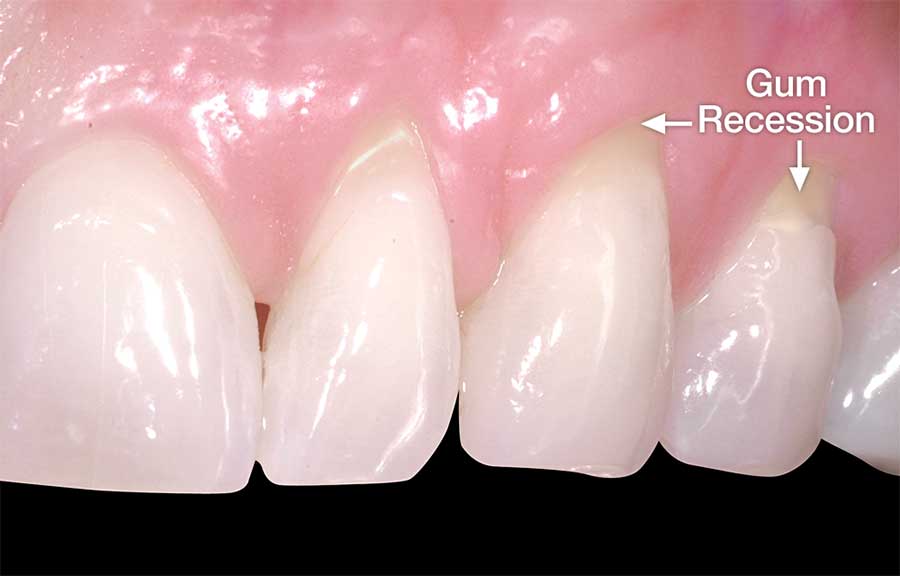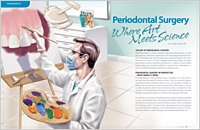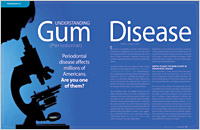
You may not know what gum recession is — but if you've heard the phrase “long in the tooth,” you already know one thing about this condition: It is indeed responsible for making your teeth seem longer. It may also be associated with increased age, as the saying suggests. But because gum recession is a gradual process, it is often difficult to notice while it's occurring. Besides appearing to “lengthen” teeth, other symptoms of gum recession may include tooth sensitivity and an uneven gum line.
Causes of Receding Gums
There a number of things that can cause gums to recede, or shrink back, and expose the roots of your teeth. The way you care for your teeth can be a major factor. If you do not effectively remove plaque (bacterial biofilm) from your teeth every day, you may develop gum inflammation, gum disease and/or recession. Conversely, if you brush or floss too hard or for too long, you can also damage your gums. It doesn't take a great deal of pressure to remove plaque — the important thing is to effectively clean each tooth, right down to the gum line.
Other causes of gum recession include misaligned teeth and muscle attachments (frenums) pulling at the gum line; a lack of gum tissue protecting the tooth to begin with can also influence the contour of the gum line. Badly fitting oral appliances such as dentures, braces — even tongue bolts and lip piercings — can cause gum recession as well. Genetic factors and hormonal changes may make you more vulnerable to this condition.
Treating Gum Recession
Periodontists are dentists who specialize in treating problems of the gums and other tissues of the mouth. There are several ways receding gums can be treated. One is called gingival (gum) grafting or periodontal plastic surgery. This procedure often begins by taking a small piece of healthy gingival tissue from the roof of your mouth and grafting (attaching) it to the area where it is needed. Alternatively, laboratory-processed donor tissue can be used instead of your own tissue. Ultrafine sutures (stitches) hold the graft in place until it “takes.” In either case, the procedure has a very good success rate.
Also, you can't have gum recession without first losing some bone tissue beneath the gum line. Sometimes, a procedure to regenerate the lost bone may be recommended. One type of procedure involves making small incisions to create a “flap” in the gums, and placing a tiny amount of grafting material and a barrier membrane under the surface. In a short time, your body will use this material as a scaffold to build up its own bone tissue in the desired location. A similar procedure may be used to remove harmful bacteria from “pockets” that may have formed beneath the gums.
Preventing Gum Disease
Gum disease is a chronic condition — meaning that if left alone, it will worsen over time. Prevention is the primary means of keeping this problem at bay. The best way to fight gum recession is to maintain good oral hygiene: That means brushing and flossing every day, and visiting our office regularly. If gum recession becomes a problem, you may be asked to come in more frequently for exams and preventive treatment. With careful attention to your oral health, gum disease can be successfully controlled — and your smile can look healthy forever.
Related Articles

Periodontal Plastic Surgery
Millions of Americans have some degree of gum recession — a loss of the tough, pink tissue that surrounds teeth. Receding gums can cause anything from minor tooth sensitivity to tooth loss in very severe cases. Fortunately, the field of periodontal plastic surgery has made enormous strides in devising techniques, including grafting, to deal with the problem of lost or damaged gum tissue... Read Article

Periodontal Surgery — Where Art Meets Science
This article is an overview of how the art of plastic surgical procedures and the science of periodontics can enhance the health and beauty of your teeth. You will learn what periodontal surgery is designed to do, what makes it successful and what to expect during treatment... Read Article

Understanding Gum (Periodontal) Disease
Have your gums ever bled when you brushed or flossed? This most commonly overlooked simple sign may be the start of a silent progressive disease leading to tooth loss. Learn what you can do to prevent this problem and keep your teeth for life... Read Article